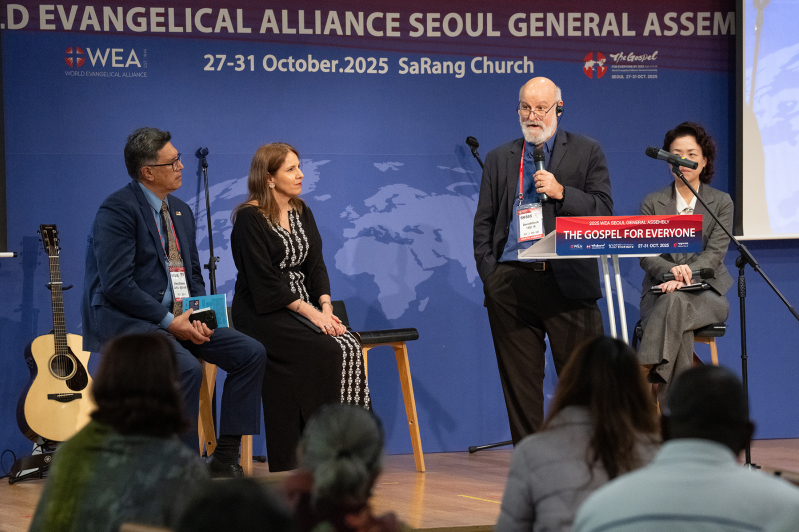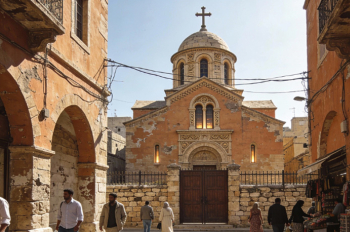
The second panel discussion of the World Evangelical Alliance (WEA) General Assembly on Monday morning, Oct. 27, turned its focus to the world’s growing urban centers and the challenge of living out the gospel amid pluralistic cultures.
The session, titled “Living the Gospel in Culture and Cities,” featured Dr. Chris Elisara, WEA Special Envoy for Environment, Climate & Cities, and Dr. Darrell Bock, Executive Director for Cultural Engagement at Dallas Theological Seminary.
Opening the discussion, Elisara emphasized that God’s concern for creation extends deeply to the cities where most of humanity now lives. “God loves cities — always has and always will,” he said. “Creation itself is the material manifestation of God’s love, and the first thing He made was a neighborhood — a place where humanity could flourish.”
He described the biblical narrative as beginning and ending with a city — from the Garden of Eden to the New Jerusalem — both representing places of flourishing under God’s design. “At the beginning, God created a place for us to flourish,” Elisara said. “At the end, the city comes back as a garden city, a place where creation and community are restored.”
Reflecting on Jesus weeping over Jerusalem, Elisara asked whether Christians today share that same compassion. “Do we weep over our cities — the places meant for flourishing that have fallen into decay?” he asked. “Jesus did, and through the cross He brought heaven on earth to transform the city.”
Elisara urged evangelicals to develop practical theology and training to engage rapidly expanding urban contexts. “Are we ready for this?” he said. “Do we have the theology, the skillset, the mindset to transform cities? The gospel is not only for everyone — it is for everything, including cities and places.”
Transforming culture through changed hearts
Following Elisara, Bock addressed how the Church should engage pluralistic societies where diverse worldviews coexist. “You transform cities with changed hearts,” he said. “You transform cities with people who reconnect to the living God from whom they’ve been separated.”
Bock cautioned against relying solely on laws or political influence to shape culture. “Government works, but we live in a fallen world,” he said. “Transformation cannot come from laws alone — it comes through the gospel working in people’s lives.”
He described pluralism as “a Middle Eastern bazaar” filled with competing ideas and values, urging Christians to make sense of the chaos through what he called “faithful presence.” “Our battle is not against flesh and blood,” Bock said, referencing Ephesians 6. “People are not the enemy; they are the goal.”
Bock said the Church must engage society not through ideology or privilege but through persuasion, love, and respect. “The armor we have is not political ideology,” he said. “It’s our faith, our righteousness, the gospel, prayer, and the Word of God.”
A ministry of persuasion, not privilege
Expanding on his theme, Bock said that every person — regardless of belief — has the right to participate in the public square. “When I sit at the table next to an atheist, a Buddhist, or a Muslim, we all have the right to be there,” he said. “We are in a ministry of persuasion, not a ministry of privilege.”
He urged evangelicals to communicate the gospel relationally and respectfully. “Evangelism is about creating categories people do not have,” Bock said. “When you tell someone that Jesus is the Son of God, that’s an extraordinary claim. It must be explained with gentleness and respect.”
Tone, he said, is a defining element of gospel witness. “We challenge because we love,” he added. “The gospel holds both challenge and invitation — and if we never reach the invitation, we have not offered the hope of the gospel. That’s why tone matters.”
Serving cities through the gospel
Both speakers agreed that cities represent one of the most urgent frontiers for evangelical mission in the 21st century. Elisara framed the task as part of God’s redemptive plan for creation. “Cities are where the gospel must take root,” he said. “They are the front line of mission and transformation.”
Bock echoed that call, describing the Christian’s role as one of service rather than conquest. “We’re called to serve the city — even places like Babylon,” he said, referencing Jeremiah 29. “Christ restores the possibility of flourishing, and He calls us to work for the good of the city, even when the culture around us resists Him.”
As global urbanization accelerates, the panelists said the Church must recover a vision of the gospel that integrates faith, culture, and place. “The gospel is not just a message of personal salvation,” Elisara concluded. “It is good news for neighborhoods, for cities, and for creation itself.”
Click here for CDI's full reporting from the WEA General Assembly.






